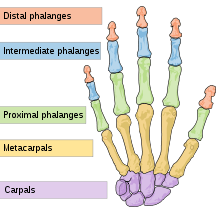Definify.com
Webster 1913 Edition
Phalanx
Pha′lanx
,Noun.
pl.
Phalanxes
(#)
, L. Phalanges
(#)
. [L., from Gr.
φάλαγξ
.] 1.
(Gr. Antiq.)
A body of heavy-armed infantry formed in ranks and files close and deep. There were several different arrangements, the phalanx varying in depth from four to twenty-five or more ranks of men.
“In cubic phalanx firm advanced.” Milton.
The Grecian
phalanx
, moveless as a tower. Pope.
2.
Any body of troops or men formed in close array, or any combination of people distinguished for firmness and solidity of a union.
At present they formed a united
phalanx
. Macaulay.
The sheep recumbent, and the sheep that grazed,
All huddling into
All huddling into
phalanx
, stood and gazed. Cowper.
3.
A Fourierite community; a phalanstery.
4.
(Anat.)
One of the digital bones of the hand or foot, beyond the metacarpus or metatarsus; an internode.
Webster 1828 Edition
Phalanx
PHAL'ANX
,Noun.
1.
Any body of troops or men formed in close array, or any combination of people distinguished for firmness and solidity of union.2.
In anatomy, the three rows of small bones forming the fingers.3.
In natural history, a term used to express the arrangement of the columns of a sort of fossil corolloid, called lithostrotion, found in Wales.Definition 2026
Phalanx
Phalanx
See also: phalanx
English
Proper noun
Phalanx
- The brand name of a radar-controlled rapid fire 20mm Gatling-type machine gun, the Phalanx CIWS (pronounced see-wiz), deployed on U.S. Navy ships as a last line of defense against antiship cruise missiles.
See also
-
 Phalanx CIWS on Wikipedia.Wikipedia
Phalanx CIWS on Wikipedia.Wikipedia
phalanx
phalanx
See also: Phalanx
English

An Ancient Macedonian phalanx

Bones of the hand: carpals, metacarpals and phalanges
Noun
phalanx (plural phalanxes or phalanges)
- (historical, plural phalanxes) An ancient Greek and Macedonian military unit that consisted of several ranks and files (lines) of soldiers in close array with joined shields and long spears.
- (historical sociology) A Fourierite utopian community; a phalanstery.
- (plural phalanxes) A large group of people, animals or things, compact or closely massed, or tightly knit and united in common purpose.
- 2007 April 25, Hélène Mulholland, “Blair refuses to condemn FoI bill”, in The Guardian, London, archived from the original on 3 October 2014:
- The Guardian today listed a phalanx of ministers who back the bill, including Tessa Jowell, the culture secretary, Tony McNulty, the policing minister, Andy Burnham, the junior health minister, Ian Pearson, the climate change minister, John Healey, the financial secretary to the Treasury, and Keith Hill, parliamentary private secretary to Tony Blair.
- 2007 May 6, Sean O'Hagan, “The day I thought would never come: This week, Ian Paisley and Martin McGuinness will astonish those who experienced the Troubles”, in The Guardian, London, archived from the original on 3 October 2014:
- There, the Paisleyites were being held back by another phalanx of soldiers and policemen.
-
- (anatomy, plural phalanges) One of the bones of the finger or toe.
Synonyms
- (anatomy, bone of the finger or toe): phalange
Hyponyms
- (bone of the finger): distal phalanx, intermediate phalanx, proximal phalanx
Translations
ancient Greek military unit
|
finger or toe bone
|
|
large group of animals, plants, or people
large group of people
Latin
Alternative forms
- falanx (later form)
Etymology
From Ancient Greek φάλαγξ (phálanx). Compare Latin phalanga.
Pronunciation
- (Classical) IPA(key): /ˈpʰa.lanks/, [ˈpʰa.ɫaŋks]
Noun
phalanx f (genitive phalangis); third declension
Inflection
Third declension.
| Case | Singular | Plural |
|---|---|---|
| nominative | phalanx | phalangēs |
| genitive | phalangis | phalangum |
| dative | phalangī | phalangibus |
| accusative | phalangem | phalangēs |
| ablative | phalange | phalangibus |
| vocative | phalanx | phalangēs |
References
- phalanx in Charlton T. Lewis and Charles Short (1879) A Latin Dictionary, Oxford: Clarendon Press
- phalanx in Charlton T. Lewis (1891) An Elementary Latin Dictionary, New York: Harper & Brothers
- Félix Gaffiot (1934), “phalanx”, in Dictionnaire Illustré Latin-Français, Paris: Hachette.
- Meissner, Carl; Auden, Henry William (1894) Latin Phrase-Book, London: Macmillan and Co.
- to form a phalanx: phalangem facere (B. G. 1. 24)
- to break through the phalanx: phalangem perfringere
- to form a phalanx: phalangem facere (B. G. 1. 24)
- phalanx in Harry Thurston Peck, editor (1898) Harper's Dictionary of Classical Antiquities, New York: Harper & Brothers
- phalanx in William Smith et al., editor (1890) A Dictionary of Greek and Roman Antiquities, London: William Wayte. G. E. Marindin